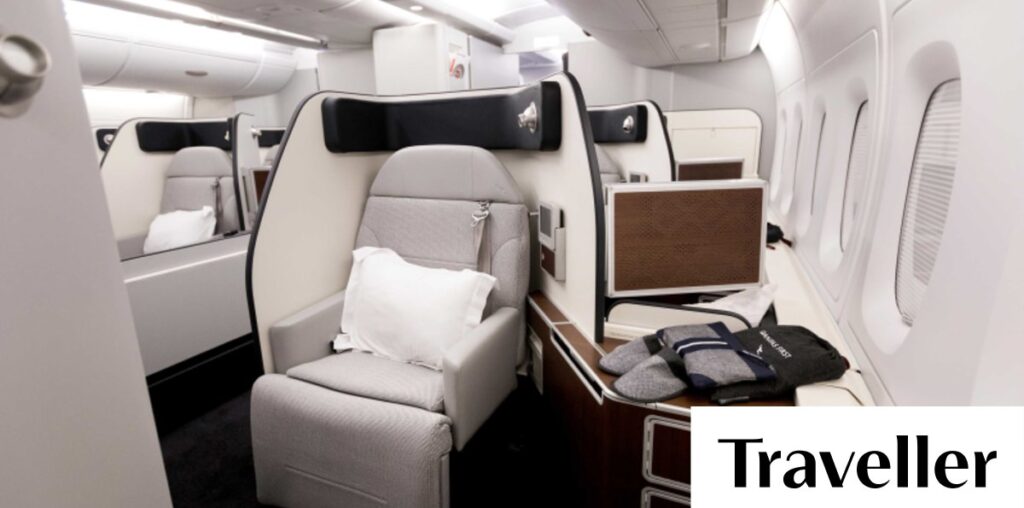Typically, when an airline or online travel agent spots its mistake, it is entitled to cancel the tickets and offer a refund to customers. However, some airlines appear to see the mistake as an opportunity to get good PR. Honouring the tickets is costly, but cancelling them can come with a swath of negative press. Flight deals site Jack’s Flight Club estimates about 70 per cent of error fares are honoured, while Going.com says between 80 and 90 per cent of error fare tickets go ahead without cancellation.

Cathay Pacific honoured its tickets after accidentally selling first- and business-class fares for economy prices in 2019. Credit:
How to find and secure an error fare
There are a number of websites and newsletters that comb the internet for error fares, though most are focused on US routes. Jack’s Flight Club publishes a premium newsletter ($8 a month) alerting subscribers to these fares as soon as they are detected.
Drew Stewart, head of marketing at Jack’s Flight Club, says: “We find them like we do every other deal: scouring the internet for price drops on routes. If that price drop is so much cheaper than anything we’ve ever seen before, nearing half the price or more than we’d usually expect a good price on that route to be, we’d consider that an error fare.”
Jack’s Flight Club advises that, after detecting an error fare, customers should try to book it directly via the airline’s website. They say there have been instances where the airline has honoured direct bookings but asked OTAs to cancel the tickets. They also advise that more reasonable error fares are more likely to be honoured. For example, a $20 first-class ticket is less likely to be honoured than one costing $600. Other websites, such as Secret Flying, also log error fares, including hotel deals. Going.com (previously Scott’s Cheap Flights) is another helpful resource, but it is primarily for US routes. All suggest the key to securing error fares is to act fast.
Loading
“If you call or email the airline, or otherwise alert them about the error fare, there is a very high chance that they will correct the mistake, and/or cancel some or all of the bookings,” advises US firm TravelPirates.
Another way to detect error fares is to set up customised alerts on specific routes on price comparison sites such as Kayak. When an airfare drops below a certain price, you will receive an email alert. Other sites, such as Hopper, offer price alerts through an app, meaning you will receive a notification when one of your followed routes drops below a certain benchmark. Alternatively, go on Skyscanner or Google Flights, select the destination “everywhere” over flexible dates and see if you can find any tickets at unusually low rates.
What are the risks?
You are not breaking any laws by booking an error fare, although it will almost certainly be spotted by the airline before too long.
Loading
As outlined above, many error fares will be honoured, but it is advisable that you leave it a while before booking other elements of your trip such as car hire and accommodation. If they’re going to cancel tickets sold at a mistaken rate, airlines will likely do so soon after they have detected the error, though it is not unheard of that these tickets are cancelled weeks or months later.
The chance that you could be left with non-refundable elements of a holiday, but no flights, is something to be taken seriously, and a scenario that your travel insurance provider will likely view with little sympathy.
If you do decide to snaffle an error fare, it would be wise to book your ticket using a credit card, as they will be able to offer more support in getting a refund if the airline cancels your ticket.
Finally, it is worth being savvy about whether your discounted tickets are legitimate, given there are fraudulent and believable online holiday companies in operation. Price comparison sites such as Skyscanner vet the OTAs listed in their results, so you might want to enter the route and dates on there to see if other companies list the same low cost. You should always conduct wider research about the website you are booking through: the Australian government’s AUSTRAC website has advice on spotting scam sites. If in doubt, always book directly through the airline’s website or via a trusted OTA that you have used before.
The Telegraph, London

